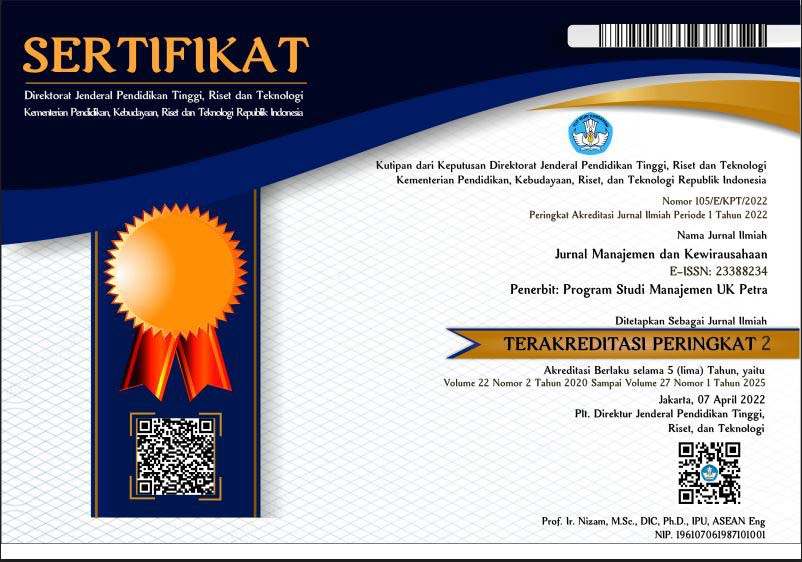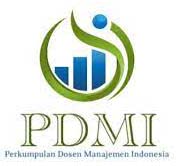THE INFLUENCE OF INDIVIDUAL KNOWLEDGE AND WORK TEAM DEVELOPMENT TO THE MANUFACTURING COMPANY PERFORMANCE OF IN EAST JAVA
 :
:
https://doi.org/10.9744/jmk.19.1.22-27
Keywords:
Individual knowledge, work team development, work flexibility effectiveness, and company performance.Abstract
Individual knowledge is the fundamental human capital to contribute to the greatness of the company.The personal capability and competence should be dispersed to other individuals within the organization to
form a work team that is reliable and motivated so that each individual can easily do the work
communication. As a result, it gives an impact on the flexibility of working people and eventually can
improve the company performance. The data are collected by questionnaires that are distributed to 90
industrial practitioners, with the 86 completed data that can be further processed. The result of this study
states that the individual knowledge influences strongly on the development of the competent work team, and
enhances the collaboration and communication process. The development of the work teams in the company
affects the collaboration, communication, and effectiveness of the work teams. Finally, the cooperation and
communication in the work place and the effectiveness of the work teams together improve the company
performance.
References
Ardichvili, A., Maurer, A. & Li, W. (2006). Cultural influence on knowledge sharing through online communities of practice. Journal of Knowledge Management, 10(1), 94–107. [CrossRef]
Banerjee, P. (2003). Resources, capability and coordination: Strategic management of information in Indian information sector firms. International Journal of Information Management, 23, 303–311. [CrossRef]
Basu, V., Hartono, E., Lederer, A. L., & Sethi, V. (2002). The impact of organizational commitment, senior management involvement, and team involvement on strategic information system planning.International Journal of Information Management, 39, 513–524. [CrossRef]
Bhatnagar, J. (2008). Managing capabilities for talent engagement and pipeline development. Industrial and Commercial Training, 40(1), 19–28. [CrossRef]
Cabrera, E. & Cabrera, A. (2005). Fostering knowledge sharing through people management practices. International Journal of Human Resources Management, 16(5), 720–735. [CrossRef]
Cooper, D. R. & Schindler, P. S. (2008). Business research methods (10th edition). McGraw Hill Irwin, New York. [CrossRef]
Dechawatanapaisal, D. (2005). HRM as enablers of learning work behaviour: Perspectives from Thai ICT professionals. Research and Practice in Human Resource Management, 13(1), 30–45. [CrossRef]
Dufrene & Lehman. (2002). Building high performance teams. USA: Thomson Learning. [CrossRef]
Emmerik, I. J. H. V. & Sanders, K. (2005). Mismatch in working hours and affective commitment: Differential relationships for distinct employee groups. Journal of Managerial Psychology, 20(8), 712–725. [CrossRef]
Harvey, M. & Napier, N. (2004). The impact of global time on the role of expatriate managers. Research and Practice in Human Resource Management, 12(1), 92–133. [CrossRef]
Ho, C. (2007). A framework of the foundation theories underlying the relationship between individuals within a diverse workforce. Research and Practice in Human Resource Management, 15(2), 75–91. [CrossRef]
Hoof, B. V. D. & Deridder, J. A. (2004). Knowledge sharing in context: The influence of organiza-tional commitment, communication climate and CMC use on knowledge sharing. Journal of Knowledge Management, 8(6), 117–130. [CrossRef]
Hosie, P., Forster, N., & Sevastos, P. (2004). The impact of global pressures on the affective well being of Australian managers performance. Research and Practice in Human Resource Management, 12(1), 134–171. [CrossRef]
Hu, M. M., Horng, J. S., & Sun, Y. H. C. (2009). Hospitality teams: Knowledge sharing and service innovation performance. Tourism Management, journal homepage: www.elsevier.com/ locate/tourman. [CrossRef]
Johnson, J. (2004). Flexible working: Changing the managers role. Management Decision, 42(6),721–737. [CrossRef]
Lewis, S., Frenmouw, W. J., Del Ben, K., & Farr, C. (2001). An investigation of the psychological characteristics of stalkers: Empathy, problem solving, attachment and borderline personality features. Journal of Forensic Sciences, 46, 80–84. [CrossRef]
Liao, C. & Chuang, A. (2004). A multilevel investigation of factor influencing employee service performance and customer outcomes. Academy of Management Journal, 47(1),41–58. [CrossRef]
Magnini, V. P. (2008). Practicing effective knowledge sharing in international hotel joint ventures. International Journal of Hospitality Manage-ment, 27, 249–258. [CrossRef]
Maley, J., & Kramar, R. (2007). International Performance Appraisal: Policies, practices and pro-cesses in Australian subsidiaries of healthcare MNCs. Research and Practice in Human Resource Management, 15(2), 21–40. [CrossRef]
Osterloh, M. & Frey, B. S. (2000). Motivation, knowledge transfer, and organization forms. Organization Science, 11(5), 538–550. [CrossRef]
Parris, M. A., Vickers, M. H. & Wilkes, L. (2005). Being “stretched” and “squeezed”: Organizational flexibility and the middle manager”. 4th International Critical Management Studies Conference Cambridge, United Kingdom. [CrossRef]
Quang, T. & Vuong, N. T. (2002). Management styles and organizational effectiveness in Vietnam. Research and Practice in Human Resource Management, 10(2), 36–55. [CrossRef]
Spencer, L. M. J. & Spencer, S. M. (1993) Competence at work: models for superior perfor-mance. 1st Edition, Wiley, New York. [CrossRef]
Wang, Y. & Nicholas, S. (2005). Knowledge transfer, knowledge replication, and learning in non-equity alliances: Operating contractual joint ventures in China. Management International Review, 45(1), 99–118. [CrossRef]
Wasjo, M. M. and Farad, S. (2005). Why should i share? examining social capital and knowledge contribution in electronic networks of practice, MIS Quarterly, 29, 35–57. [CrossRef]
Downloads
Published
How to Cite
Issue
Section
License
Authors who publish on this journal agree to the following terms:
- Authors retain copyright and grant the journal right of first publication with the work simultaneously licensed under a Creative Commons Attribution License that allows others to share the work with an acknowledgement of the work's authorship and initial publication in this journal.
- Authors are able to enter into separate, additional contractual arrangements for the non-exclusive distribution of the journal's published version of the work (e.g., post it to an institutional repository or publish it in a book), with an acknowledgement of its initial publication in this journal.
- Authors are permitted and encouraged to post their work online (e.g., in institutional repositories or on their website) prior to and during the submission process, as it can lead to productive exchanges, as well as earlier and greater citation of published work (See The Effect of Open Access).

















